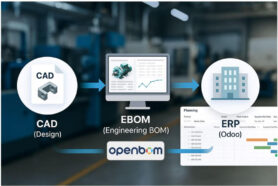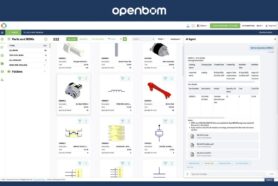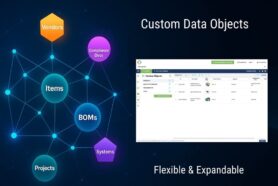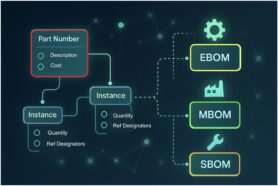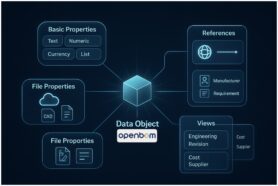
Chances are if you’re in manufacturing, you use Excel (or another type of spreadsheet) to manage your bills of materials (BOMs). And chances are also good that your boss has given you grief about it.
Excel Can Do It?
Earlier today, I was talking with one of the design engineers about OpenBOM. The conversation was somewhat ugly. Here is a quote to give you an idea – “Engineer: I have my nice and simple Excel to get BOM out of SOLIDWORKS and my life was easy. I was creating the Excel from SW, and throwing it via email to other team members. That’s it… No, my boss is asking to have OpenBOM manage the process and the data. Why should I do it?”
The opinion that “Excel can solve any problem” is not uncommon. For generations of engineers, Excel was the second-best software for everything you need. I summarized it more than a decade ago in my article – Why do I like my PLM Excels Spreadsheet? The ease and simplicity of Excel were unmatched for many years. It is simple, easy, flexible, and transferable. Everyone loves it, but… after some time, it turns into a mess. And here is my second article – PLM Excel: From Odes to Woes. You don’t know where you left off last on Excel, you need to update it all the time, it is time-consuming and you cannot have a single place where you manage data and its lifecycle. Let’s talk about the last one today because it is key.
Why My Boss Doesn’t Like Excels
In product development and manufacturing, everyone needs the data, but no one is actually interested in data management. We need data for everything- to count parts, manage cost, control changes, and revisions, get access to the right file, spec, or report. But when it comes time to decide who will be responsible for data management, you are not going to see many people that want to volunteer to do so as part of their responsibilities.
Over the years, working with engineers and industrial companies, I’ve heard the story of “simple Excels” many times. And it comes again and again when companies need to get their data organized and take the change process under control.
I collected five fundamental reasons why your boss might not like BOM Excels as a solution for the data management problem:
Where is the last Excel?
Until you keep your Excel on your computer or personal network folder, it is all cool. Once you need to send it to somebody else, you start creating multiple copies. The copy you sent today, yesterday’s copy, last week’s copy, etc. To control all these files is an impossible thing. Some organizations create a shared Excel, but then things get ugly in a different way. Check my next point.
How many people can change the same Excel at the same time?
The great idea of sharing Excel can give you a bit of pain relief, but immediately after that, the questions start to come like a waterfall. A procurement manager just entered a supplier name and P/N with a price, but a designer needs to update the description and also change the port number. People editing the same Excel are literally stepping over each other and mistakes are growing like a snowball.
There are so many different Excels…
Engineers don’t work alone these days. Mechanical BOM, electronic BOM, Software, Packaging… the list goes on. Each one has its own “little” Excel that somehow needs to get together with another one… and another one, and another one… How do you count them all together and how do you update them all together? This is how companies are growing a new position – CEO (chief excel officer) to manage all the Excel mess. And things are getting messy quickly.
Can I roll up a cost?
Let’s say you settled on a combined Excel to manage all your data. Here is the next question that comes up very quickly. Can I count all quantities and costs based on the Excel data? The question is much more complex than you can think because a typical BOM has levels and the total cost (or any other values, eg. weight) must be calculated dependent on the unit cost and associated quantities. The latter must be collected from multiple levels, etc.
Where are files, revisions, and traceability?
I’ve been talking about BOM as a spreadsheet, but eventually, there are files that must be associated with the data in BOM and they need to be managed. You can put that on a separate disk and make it shared. However, depending on the shares, the data might (or might not be) available differently for different people. To make things even more complex, you need to manage multiple revisions of the BOM and trace parts used by multiple projects and contractors. And then you’re totally lost…
How OpenBOM is Different?
OpenBOM is a cloud-native platform that makes your life amazingly simple by taking care of all the issues I’ve been talking about earlier in this article. Here are the top 6 differences:
- OpenBOM manages a single source of truth about item and BOM data
- Data is completely flexible and can be modified (similar to Excel)
- OpenBOM allows File attachments and provides dedicated storage for file(s)
- OpenBOM manages revisions and history of everything you do
- OpenBOM calculations and formulas allow managing rollups and other calculations
- Data is shared seamlessly and everyone has simultaneous data access based on their role.
Conclusion
Although managing a small and simple Excel sounds like an easy task for an individual engineer, in fact, it can turn out as a data mess. I’ve seen the evidence of poor data management in companies, losing track of their projects, sending wrong BOMs to contractors, ordering wrong quantities of parts, and being unable to prove their regulatory compliance. The list can go on… OpenBOM allows you to remove the headache of Excel data management and switch to a simple, yet powerful data management framework allowing you to manage data easily and share data seamlessly.
REGISTER FOR FREE and check out what OpenBOM can do for you. You can start a 14-day trial to test all OpenBOM’s features.
Best, Oleg
Join our newsletter to receive a weekly portion of news, articles, and tips about OpenBOM and our community.


